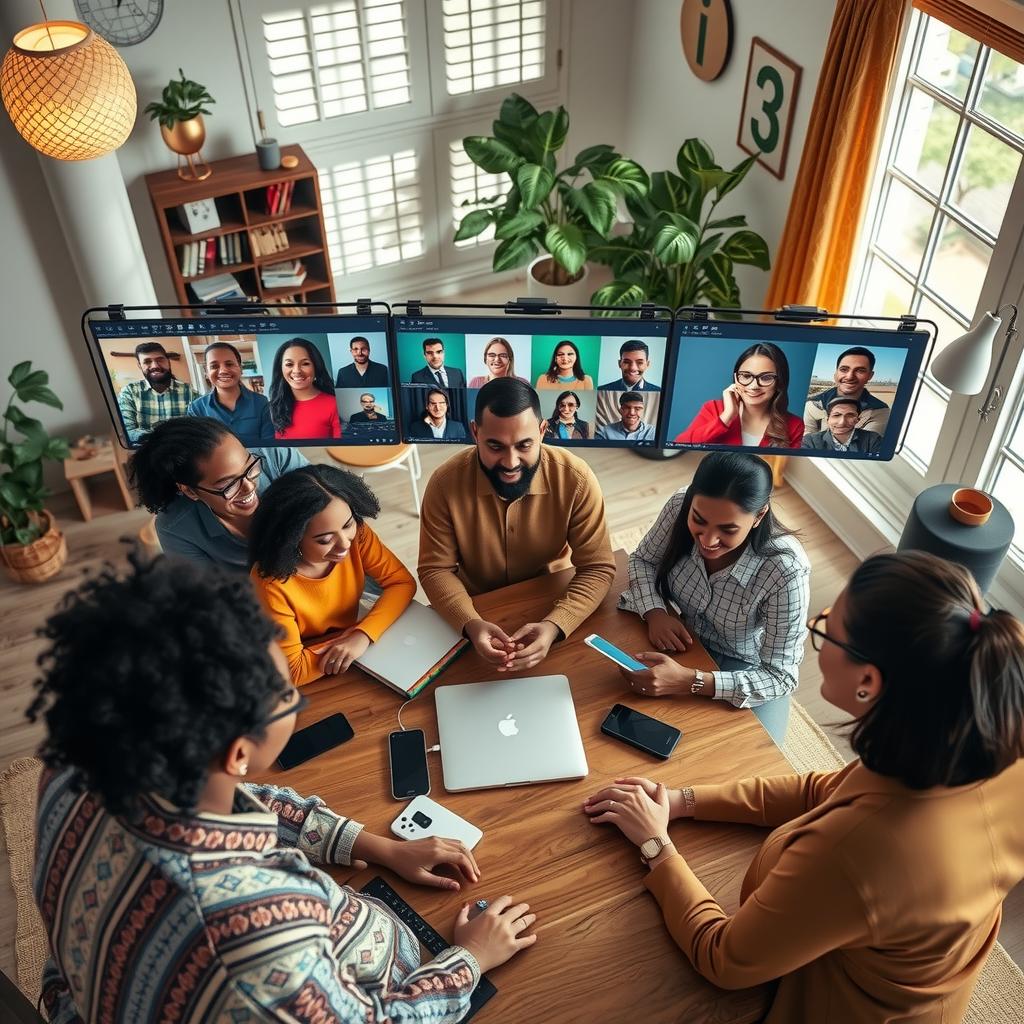In an increasingly interconnected world, the phenomenon of diverse cultures coexisting within remote teams is not just a norm but a necessity. Have you ever wondered how some team leaders effortlessly bridge cultural gaps while others struggle to communicate effectively? The disparity often lies in their understanding of cross-cultural communication. As businesses expand globally, the art of navigating cultural differences has become essential for effective leadership in virtual environments. For those at the helm of remote teams, mastering these skills can mean the difference between harmonious collaboration and frustrating misunderstandings.
The core value of this discussion centers on empowering remote team leaders with tools that enhance their communication skills across varied cultural landscapes. By engaging in specialized training like cross-cultural communication courses, leaders can cultivate a deeper awareness and appreciation of diverse perspectives. This knowledge not only fosters an inclusive workspace but also drives productivity by ensuring that every team member feels valued and understood—regardless of their geographical location.
Imagine leading a virtual meeting where each participant’s voice resonates harmoniously instead of competing for attention amidst misinterpretations and assumptions stemming from different backgrounds. Such scenarios are achievable through structured online training designed specifically for enhancing cross-cultural interactions among virtual teams. These courses offer practical strategies that help leaders recognize potential pitfalls associated with cultural misunderstandings while equipping them with techniques to promote effective communication within their teams.
Furthermore, as organizations continue to embrace flexibility through remote work arrangements, investing time in learning about team collaboration across cultures becomes paramount. It prepares remote leaders not just to manage tasks effectively but also to inspire trust and camaraderie among team members who may never meet face-to-face yet contribute significantly towards shared goals.
By diving into this article on Cross-Cultural Communication Courses, readers will discover how strategic investments in professional development can transform their approach to leading diverse teams remotely. The insights provided here aim to unveil actionable steps towards becoming proficient navigators amid complex cultural dynamics—a journey well worth embarking upon for anyone serious about thriving as a leader today.

Key Points:
-
Understanding Cultural Differences: Insight into diverse communication styles
Understanding cultural differences is fundamental for remote team leaders. By participating in cross-cultural communication courses, leaders gain insights into how various cultural backgrounds shape communication styles and expectations. This knowledge enables them to adapt their approach, ensuring that all team members feel valued and understood. -
Enhancing Communication Skills: Practical strategies for effective dialogue
Effective communication is essential in remote work settings where teams are geographically dispersed. The skills acquired through specialized cross-cultural communication courses empower leaders to foster open dialogue among team members. These practical strategies enhance overall communication skills, promoting an environment of mutual respect and collaboration. -
Building Team Collaboration: Creating cohesive virtual environments
To drive innovation within organizations, it’s crucial for remote team leaders to cultivate strong interpersonal relationships among diverse members. By embracing the principles taught in cross-cultural communication courses, leaders can bridge gaps created by geographical distances and differing viewpoints, ultimately enhancing team collaboration. This creates a cohesive virtual environment where every member feels empowered to contribute effectively.

Understanding Cultural Differences in Remote Leadership
Essential Insights for Fostering Collaboration in Diverse Teams
In today’s globalized world, the ability to navigate cultural differences is paramount for effective remote leadership. As teams increasingly operate across borders, understanding how diverse cultural backgrounds shape communication styles and expectations becomes essential for fostering collaboration. Leaders must recognize that individuals from different cultures may interpret messages differently due to varying norms and values surrounding communication. For instance, while some cultures appreciate directness and brevity in conversation, others may favor a more nuanced approach that values context and relationship-building. This disparity can lead to misunderstandings if not addressed adequately.
To bridge these gaps in communication, organizations should prioritize cross-cultural communication courses designed specifically for remote team leaders. Such programs equip individuals with the necessary skills to adapt their communication strategies according to the cultural contexts of their team members. By honing these skills, leaders can facilitate more effective interactions among virtual teams, ultimately enhancing overall productivity and morale within the group. Moreover, understanding nuances such as high-context versus low-context communications allows leaders to tailor their messages appropriately—ensuring clarity without alienating any team member.
Effective remote leadership also hinges on recognizing how cultural differences influence conflict resolution strategies within teams. In some cultures, avoiding confrontation is preferred; while in others, addressing issues head-on may be seen as constructive engagement. Leaders who are aware of these tendencies can cultivate an environment where all voices are heard respectfully and conflicts are resolved amicably—resulting in stronger teamwork dynamics even when operating virtually.
Furthermore, investing time into online training focused on developing intercultural competencies enables leaders not only to enhance their own skills but also empowers them to guide their teams effectively through challenges that arise from diversity-related issues. These training sessions often incorporate practical exercises tailored towards real-world scenarios faced by remote teams—a method proven successful in reinforcing learning outcomes.
Ultimately, embracing cultural differences is not merely about avoiding miscommunication; it serves as a foundation upon which trust and collaboration can flourish within diverse groups working remotely. As organizations continue adopting flexible work models necessitating virtual interaction between culturally varied employees, integrating cross-cultural communication courses into leadership development will emerge as an invaluable strategy for achieving sustained success across global markets. Through informed leadership practices grounded in an appreciation of culture-specific nuances—as well as ongoing commitment toward enhancing individual communication skills—teams will be better positioned to thrive amidst complexity inherent within modern business environments.

The Importance of Tailored Training Programs
Equipping Leaders to Navigate Cultural Challenges
In today’s globalized business landscape, the ability to communicate effectively across cultures is paramount. Cross-cultural communication courses provide leaders with essential tools and strategies that enhance their capacity to manage diverse teams successfully. These tailored training programs are designed not only to impart knowledge about different cultural norms but also to equip leaders with practical skills necessary for navigating cultural challenges in real-time scenarios. By engaging in these specialized courses, leaders gain insights into the nuances of effective communication and learn how to foster an inclusive environment that celebrates diversity while driving team collaboration.
For instance, a leader who has undergone cross-cultural communication training will acquire techniques for recognizing and bridging gaps arising from cultural differences within their team. Such training emphasizes the importance of active listening, empathy, and adaptability—skills that are crucial when leading virtual teams spread across various geographical locations. Furthermore, as remote team leadership becomes increasingly prevalent due to technological advancements and changing workforce dynamics, understanding how culture influences behavior can significantly improve interactions among team members.
Leaders equipped with these insights are more likely to create a workplace atmosphere where open dialogue flourishes, allowing employees from diverse backgrounds to express their thoughts freely without fear of misunderstanding or bias. Ultimately, this leads not only to enhanced performance but also fosters innovation by leveraging unique perspectives brought forth by each individual on the team.
Enhancing Team Dynamics Through Effective Communication
Building Bridges Across Cultures
Effective communication stands at the core of successful teamwork; however, it can be severely hindered by cultural misunderstandings if left unaddressed. Cross-cultural communication courses play a pivotal role in enhancing team dynamics by providing leaders with frameworks for addressing such discrepancies head-on. These programs offer participants opportunities for immersive learning experiences where they can engage in simulated scenarios reflecting real-world challenges faced by multicultural teams.
The significance of honing one’s communication skills cannot be overstated; it empowers leaders not just to convey messages clearly but also encourages them actively consider how those messages may be interpreted differently depending on cultural context. This dual perspective allows leaders not only to articulate goals more effectively but also helps build trust among remote colleagues who may have varying expectations shaped by their respective cultures.
Furthermore, through online training modules focused on cross-cultural issues facing today’s businesses—such as differing attitudes toward hierarchy or conflict resolution styles—leaders become adept at tailoring their approaches according solely on situational demands rather than relying upon one-size-fits-all methods which could alienate certain groups within the organization.
By fostering an environment conducive towards collaborative problem-solving rooted firmly within shared objectives yet sensitive towards distinct preferences informed culturally; organizations benefit immensely from heightened morale along improved productivity levels resulting directly from better aligned strategic initiatives led forth under astute guidance derived via comprehensive educational pathways like those offered through cross-cultural communication courses.
Fostering Inclusivity in Leadership Practices
A Key Ingredient for Organizational Success
Inclusivity is no longer merely an add-on feature—it has become a fundamental component driving organizational success across industries today! In order for organizations operating amidst complexities stemming from globalization efforts aimed at expanding reach internationally whilst maintaining synergy internally requires skilled individuals capable enough navigate multifaceted environments characterized often times contradictions arising out complex identities present amongst workforces everywhere! Thus entering realm dedicated exclusively enhancing competencies associated leadership functions necessitates emphasis placed heavily upon acquiring expertise regarding intercultural exchanges taking place regularly throughout daily operations initiated either face-to-face or digitally facilitated encounters occurring frequently now thanks growing reliance technology found vastly integrated workplaces globally!
Investing time into comprehensive cross-cultural communication courses ensures every member contributing overall vision understands intricacies involved achieving seamless integration processes enabling full participation ideally suited alignments built around values respect inclusion thereby translating objectives achievable collaboratively functioning harmoniously regardless distance separating parties involved actions undertaken collectively yield desired outcomes ultimately benefiting all stakeholders engaged therein journey pursuit excellence together overcoming hurdles perceived limitations previously thought insurmountable paving way future possibilities unveiled through cooperative endeavors realized partnerships forged alongside enriched relationships cultivated intentionally purposefully advancing agendas established initially setting tone positive trajectory forward unfolding enlightening journeys await everyone participating exciting ventures ahead unlocking potential untapped harnessed collectively working unified way truly transformative impact made felt far beyond confines traditional boundaries imposed historically limiting growth aspirations nurtured continual commitment evolve adapt thrive resiliently changing world surrounding us constantly reshaping realities experienced living working amongst myriad influences shaping lives impacting decisions made effectuate lasting change witnessed over time reflective progress achieved together forging brighter tomorrow envisioned today aspiring forge legacies worth remembering generations pass onwards forever carried hearts minds alike!
Promoting Open Dialogue in Virtual Teams
Encouraging Communication Across Cultural Boundaries
Effective communication is the bedrock of any successful team, particularly for remote teams that span diverse cultures. In a virtual environment, team members may face barriers due to differing languages, cultural norms, and communication styles. To foster open dialogue among these culturally diverse groups, organizations can implement structured practices aimed at enhancing understanding and reducing potential conflicts. One essential strategy is to encourage regular check-ins where team members can share their thoughts and experiences freely. These sessions not only provide a platform for feedback but also allow participants to express their concerns or ideas in an atmosphere of trust and respect. Furthermore, organizations should consider integrating cross-cultural communication courses into their training programs; such courses equip individuals with the skills needed to navigate cultural differences effectively. By enhancing awareness around various communication styles—such as direct versus indirect approaches—team members become more adept at interpreting messages from colleagues with different backgrounds.
In addition to fostering open dialogue, establishing guidelines that promote respectful interactions can significantly enhance collaboration within virtual teams. Clear expectations regarding etiquette during discussions help eliminate misunderstandings that might arise from unintentional cultural insensitivity. For instance, acknowledging holidays or traditions specific to certain cultures demonstrates mutual respect and appreciation among team members. Additionally, utilizing technology effectively plays a crucial role in bridging gaps between cultures; tools designed for collaborative work allow real-time sharing of documents while offering features like translation services when necessary. As remote team leadership evolves alongside technological advancements, it becomes vital for leaders to model effective communication behaviors themselves by being transparent about decisions and maintaining an open-door policy through digital platforms.
Building Trust Among Remote Team Members
Cultivating Relationships Through Shared Experiences
Trust serves as the glue that holds virtual teams together despite physical distances or cultural disparities; without it, collaboration suffers significantly. Therefore, cultivating relationships founded on trust requires deliberate efforts by both leadership and individual contributors within remote settings. One way leaders can build this trust is through participative decision-making processes where all voices are heard equally regardless of rank or background—a practice which highlights the value placed on each member’s opinion while reinforcing engagement across the board.
Moreover, shared experiences contribute immensely toward relationship building; organizing virtual social events encourages informal interactions beyond typical work-related tasks—a crucial element often overlooked in conventional office environments where casual conversations occur organically during breaks or lunch hours! Incorporating elements like icebreaker games tailored specifically for multicultural audiences ensures everyone feels included right off the bat while learning about one another’s backgrounds simultaneously enhances camaraderie amongst peers who may otherwise remain strangers behind screens.
Implementing ongoing online training focused explicitly on improving interpersonal skills further empowers employees with effective strategies enabling them not just communicate better but understand how underlying assumptions shaped by culture affect perceptions too! This form of continuous professional development cultivates an environment rich with empathy towards others’ perspectives ultimately leading towards stronger bonds built upon authenticity rather than mere obligation—thus paving pathways toward lasting success wherever they find themselves working together virtually!
Frequently Asked Questions:
Q: What are the benefits of cross-cultural communication courses for remote team leaders?
A: Cross-cultural communication courses provide remote team leaders with essential skills to understand and navigate cultural differences. These courses enhance communication skills by offering insights into how various cultural backgrounds affect interactions. By applying practical strategies learned in these programs, leaders can foster a collaborative environment that values open dialogue and respect among diverse members.
Q: How do these training programs improve team collaboration in virtual settings?
A: The structured approach of cross-cultural communication courses equips leaders to create cohesive virtual teams. As they learn about effective communication techniques tailored to different cultures, they become adept at bridging gaps between team members. This proficiency leads to improved team collaboration, as every individual feels valued and understood, ultimately enhancing productivity across geographical boundaries.
Q: Why is investing in online training important for remote leadership success?
A: Investing in online training focused on effective communication is crucial for remote leadership success. Leaders who participate in cross-cultural communication courses position themselves better to tackle challenges associated with leading virtual teams. Such investment not only enhances their own skill set but also fosters an environment where innovation flourishes due to strong interpersonal relationships built on trust and understanding among diverse cultural perspectives.
